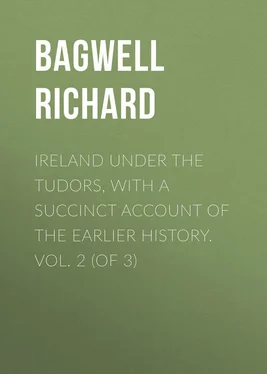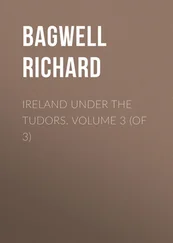Richard Bagwell - Ireland under the Tudors, with a Succinct Account of the Earlier History. Vol. 2 (of 3)
Здесь есть возможность читать онлайн «Richard Bagwell - Ireland under the Tudors, with a Succinct Account of the Earlier History. Vol. 2 (of 3)» — ознакомительный отрывок электронной книги совершенно бесплатно, а после прочтения отрывка купить полную версию. В некоторых случаях можно слушать аудио, скачать через торрент в формате fb2 и присутствует краткое содержание. Жанр: foreign_antique, foreign_prose, Историческая проза, на английском языке. Описание произведения, (предисловие) а так же отзывы посетителей доступны на портале библиотеки ЛибКат.
- Название:Ireland under the Tudors, with a Succinct Account of the Earlier History. Vol. 2 (of 3)
- Автор:
- Жанр:
- Год:неизвестен
- ISBN:нет данных
- Рейтинг книги:4 / 5. Голосов: 1
-
Избранное:Добавить в избранное
- Отзывы:
-
Ваша оценка:
- 80
- 1
- 2
- 3
- 4
- 5
Ireland under the Tudors, with a Succinct Account of the Earlier History. Vol. 2 (of 3): краткое содержание, описание и аннотация
Предлагаем к чтению аннотацию, описание, краткое содержание или предисловие (зависит от того, что написал сам автор книги «Ireland under the Tudors, with a Succinct Account of the Earlier History. Vol. 2 (of 3)»). Если вы не нашли необходимую информацию о книге — напишите в комментариях, мы постараемся отыскать её.
Ireland under the Tudors, with a Succinct Account of the Earlier History. Vol. 2 (of 3) — читать онлайн ознакомительный отрывок
Ниже представлен текст книги, разбитый по страницам. Система сохранения места последней прочитанной страницы, позволяет с удобством читать онлайн бесплатно книгу «Ireland under the Tudors, with a Succinct Account of the Earlier History. Vol. 2 (of 3)», без необходимости каждый раз заново искать на чём Вы остановились. Поставьте закладку, и сможете в любой момент перейти на страницу, на которой закончили чтение.
Интервал:
Закладка:
Richard Bagwell
Ireland under the Tudors, with a Succinct Account of the Earlier History. Vol. 2 (of 3)
CHAPTER XIX.
FROM THE ACCESSION OF ELIZABETH TO THE YEAR 1561
The proclamation of Anne Boleyn’s daughter can hardly have caused general satisfaction in Ireland, but it was hailed with joy by Protestant officials whose prospects had been clouded during the late reign. Old Sir John Alen was soon in Dublin, whence he wrote to congratulate Cecil on his restoration to office, and to remind him of his own sufferings under Queen Mary. Thomas Alen, when reminding the new secretary of his great losses, rejoiced that God had sent light after darkness, and that he and his friends were going to have their turn. A sharp eye, he said, should be kept on Sir Oswald Massingberd, who was suspected of a design to pull down Kilmainham, lest its beauty and convenience should again attract the Lord Deputy. Massingberd should be sternly restricted to his revenue of 1,000 marks, and the great seal should be transferred to a lawyer of English birth. The prior was so far successful that Kilmainham soon afterwards ceased to be a royal residence. He probably sold the lead, and the damage being aggravated by a great storm, the commandery was not thought worth repairing, and the chief governor’s abode was transferred to Dublin Castle. Sir Ralph Bagenal, formerly lieutenant of Leix and Offaly, had been dismissed for denying the Papal supremacy, and had been forced to seek refuge in France, where he lived by selling at a great sacrifice a property worth 500 l. a year. Queen Elizabeth gave him the non-residence fines of twelve bishoprics; but there were legal obstacles, and he begged for something more substantial. Staples, the deprived Bishop of Meath, pointed out his griefs to Cecil, and thinking, no doubt, more of the Queen than of his correspondent, complained that Pole had made it a grievous article against him that he had presumed to pray for the soul of his old master. Pole probably hated Henry VIII. enough to wish his soul unprayed for, but the complaint is a very odd one from a Protestant divine. 1 1 Sir John Alen to Cecil, Dec. 16, 1558; Staples to same, Dec. 16; T. Alen to same, December 18. Harris’s Dublin , chap. ii.
Sidney, whom most men spoke well of, was confirmed in the office of Lord Justice, and had soon plenty of work in the North. The old Earl of Tyrone was sinking fast, and the horrors of a disputed succession were imminent. Henry VIII. had conferred the Earldom on Con O’Neill for life, with remainder to Matthew Ferdorogh O’Neill and his heirs male for ever. The Barony of Dungannon was at the same time conferred upon the remainder man, with a proviso that it should descend upon the heir to the Earldom. Matthew’s mother was Alison Kelly, and at the time of his birth she was the wife of a smith at Dundalk. He was reputed to be Kelly’s son until he was sixteen, when his mother presented him to Con as his own child. ‘Being a gentleman,’ said his eldest son, ‘he never refused no child that any woman named to be his,’ and he accepted Matthew with a good grace. There was a Celtic law or doctrine that a child born in adultery should belong to its real father, but there is no evidence to show that the rule was actually binding in Ulster in the sixteenth century. Shane, the legitimate eldest son, made a plain statement to the contrary, and illustrated it by an Irish proverbial saying that a calf belongs to the owner of the cow, and not to the owner of the bull. Matthew became a good soldier, and Con was willing to have him for a successor. But as Shane grew up he learned to oppose this arrangement, and, having good abilities and boundless ambition, he was designated by a great portion of the clan as successor to the tribal sovereignty. Shane oppressed his father, and perhaps ultimately induced him to acquiesce in the popular choice; but to make all safe, he took the precaution of murdering the Baron of Dungannon, whose prowess he had reason to remember, and whom he had no wish to meet again in the field. He steadily maintained that his victim was the smith’s son, and no relation; but the Irish annalists lend him no countenance, for they remark that the deed was ‘unbecoming in a kinsman.’ The Baron had left a young son, on whom his title devolved, and the government were bound by the patent to maintain his ultimate rights to the Earldom. It is uncertain whether Henry VIII. knew that Matthew Ferdorogh was born while his mother lived in wedlock with the smith, but probably he may be acquitted of having encouraged one of the worst Brehon doctrines. 2 2 Ancient Laws and Institutes of Ireland , vol. iii.; Preface to Book of Aicill , p. cxlviii.; Shane O’Neill to Queen Elizabeth, Feb. 8, 1561; Campion’s History; Four Masters , 1558. Maine’s Early History of Institutions , chap. ii.
Yet Shane’s case against the Government was a strong one; for it was not disputed that his father had known the facts, and he was thus able to contend that the King had been deceived, and that the limitation in the patent was void. Besides, it was asked, why was not the Earldom given in the usual way to Con and his heirs male? Whether Shane knew of the above-mentioned Brehon regulation or not, it was his interest to affect ignorance, to represent both his father and King Henry as the victims of deception, and to take his stand on strict hereditary right for the title, and on tribal election for his personal supremacy. About strict veracity he was no more scrupulous than Queen Elizabeth herself. The dilemma was complete, for English lawyers could not for very shame deny the moral claims of the legitimate heir, nor could politicians ignore those Irish captainries which the Crown had acknowledged over and over again. By Celtic usage Con had of course no power whatever to alienate or transmit the property of the tribe: in that he had only a life interest. Shane argued, moreover, that according to the law of the Pale no lands could pass by patent without an inquisition previously taken. None could be taken in Tyrone, for it was no shire. If the English law were followed, there was, therefore, no power to divert the inheritance from him as rightful heir; if the Irish law prevailed, then he threw himself on the suffrages of the tribe. 3 3 See the arguments in Carew , 1560, vol. i. p. 304.
Shane O’Neill robbed his father and mother of all they possessed, and drove them into the Pale, where the unfortunate Con died early in 1559. Shane, who had recovered from his defeat by the O’Donnells, and secured himself by assassination against his most dangerous rival, claimed both the Earldom of Tyrone and the tribal sovereignty of the North. At first the Queen was strongly inclined to admit his pretensions. The patent was indeed fatal to them, but Elizabeth had an eminently practical mind, and the fact that Shane was in quiet possession weighed with her more than his legitimacy. In the absence of positive orders, Sidney did his best to maintain peace in the North. He repaired to Dundalk, and summoned Shane to attend him. The wily chief was loud in his professions of loyalty, but feared possible loss of reputation among his own people, and refused to go. Having less reason to regard appearances, Sidney visited Shane in his camp, and consented to act as god-father to his son, and to enter the mysteriously sacred bond of gossipred, or compaternity. O’Neill bound himself to keep the peace until the Queen should have pronounced on his claims, and Sussex, who hated him, expressed a belief that he would not keep his promise. Sidney could obtain nothing more, and Shane’s arguments were indeed such as could not easily be refuted. 4 4 There is an account of the interview in Hooker .
Интервал:
Закладка:
Похожие книги на «Ireland under the Tudors, with a Succinct Account of the Earlier History. Vol. 2 (of 3)»
Представляем Вашему вниманию похожие книги на «Ireland under the Tudors, with a Succinct Account of the Earlier History. Vol. 2 (of 3)» списком для выбора. Мы отобрали схожую по названию и смыслу литературу в надежде предоставить читателям больше вариантов отыскать новые, интересные, ещё непрочитанные произведения.
Обсуждение, отзывы о книге «Ireland under the Tudors, with a Succinct Account of the Earlier History. Vol. 2 (of 3)» и просто собственные мнения читателей. Оставьте ваши комментарии, напишите, что Вы думаете о произведении, его смысле или главных героях. Укажите что конкретно понравилось, а что нет, и почему Вы так считаете.












